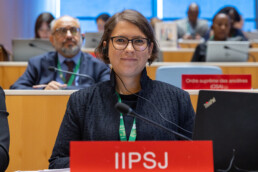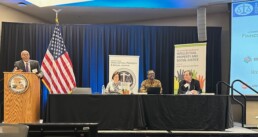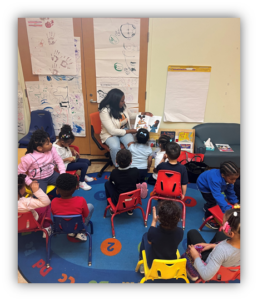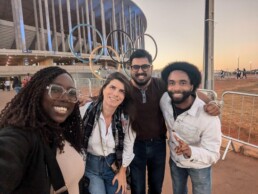Blog Post: 2025 End of Year Recap
2025 End of Year Recap
As we close another successful year, we want to highlight some of the impact of your contributions for 2025:
The Nexus of Social Justice and Intellectual Property
- Our monthly newsletters (https://iipsj.org/latest-news/) provided readers with timely and relevant recent developments in intellectual property law that have particular impacts on diverse communities and the concept of social justice.
- Working with our various academic partners, IIPSJ organized the 11th annual IP MOSAIC Conference (https://iipsj.org/programs/ip-mosaic/). The theme was IP and the Fabric of Nations.
Diversifying the Legal Field and the Intellectual Property Bar
- For twenty-two years, the IIPSJ IP and Social Justice CLE program (https://iipsj.org/2025-ip-social-justice-cle-recap/) has provided a venue through which to showcase minority and women IP attorneys. The 22nd Annual IP & Social Justice CLE program (https://www.youtube.com/playlist?list=PLpjeDSnL4i4lEMJf0N-48iqiZYF-CBvSb) explored the latest developments in IP law, including the relevant social justice impacts, strategies, and opportunities for enhancing the social efficacy of the IP legal regime.
- IIPSJ co-hosted the inaugural West Coast IP & Social Justice CLE (https://iipsj.org/programs/west-coast-ip-social-justice-cle/), which included discussions on IP social justice issues as well as attorney wellness.
- Working with our various academic partners and event sponsors, IIPSJ organized the 7th Annual HBCU IP & Tech Law Summit (https://iipsj.org/programs/hbcu-ip-tech-law-summit/), where the audience was treated to leading technology lawyers discussing Artificial Intelligence, Navigating Legal & Regulatory Issues with Emerging Technology, Legal Strategies for Developing, Advancing and Defending IP and more.
- IIPSJ continued the HBCU IP and Tech Law Summit Intellectual Property (IP) Internship Grant Program (https://iipsj.org/wp-content/uploads/2025/12/2024-25-Internship-Grant-Brochure.pdf), which was sponsored by INTA Foundation, by awarding grants to two students. Under this grant program, we enabled students enrolled in a participating HBCU law school to work as unpaid interns for public interest organizations in connection with trademark, copyright, and other IP matters. This grant program supported students who would not be able to participate in an unpaid internship without receiving additional monetary support.
Advocacy for Participation in the Intellectual Property System
- A new volume of The Cambridge Handbook of Intellectual Property and Social Justice is in development, which will be co-edited by IIPSJ Founder and Director Lateef Mtima.
- In July, IIPSJ Associate Director for International Programs, Dr. Metka Potočnik, attended the 66th World Intellectual Property Organization (WIPO) General Assemblies (GA) (https://iipsj.org/blog-post-iipsj-attendance-at-the-66th-world-intellectual-property-organization-general-assemblies/) at the WIPO Headquarters in Geneva and represented IIPSJ as a WIPO Accredited Observer. Dr. Potočnik contributed a written statement, delivered an oral statement (view here, at 00:43:51, or here) and attended the length of the proceedings in person.
Community Outreach that Empowers Creators of Color to Share, Protect, and Monetize Their Work
- IIPSJ continued our Intellectual Property for the People Series (https://iipsj.org/programs/ip-for-the-people-open-academy/) to help creators, inventors, and entrepreneurs from communities of color understand and explore the rights and resources available to them. This year’s series included the following free, one-hour webinars: Avoiding Pitfalls in the Trademark Application Process: Advice from a Former Trademark Examining Attorney and Copyright. Replays of all sessions are available on our YouTube page (https://www.youtube.com/playlist?list=PLpjeDSnL4i4mPRA4CX44FjLcSUv1CyMug).
Read our full 2025 End of Year Report here.
Blog Post: IIPSJ Attendance at the 66th World Intellectual Property Organization General Assemblies
(WIPO GA) (Geneva, 8-17 July 2025)
By Dr. Metka Potočnik (she/her/hers), Senior Lecturer in Law, Wolverhampton Law School
IIPSJ attended the 66th World Intellectual Property Organization (WIPO) General Assemblies (GA), in their capacity as the WIPO Accredited Observer. Now attending in person for the third year in a row, IIPSJ participated in the official hearings at the WIPO Headquarters in Geneva, with the Associate Director for International Programmes, Dr Metka Potočnik, attending the length of the proceedings in person. These assemblies brought together another record number of delegates (over 1,600), from 194 Member States. All sessions are available for viewing here. The opening address of the Director General Tang, can be found here.
IIPSJ attended the GA sessions for the third time in Geneva, after having observed several WIPO meetings online, since 2020. IIPSJ continues to take the GA meetings as an opportunity to build strategic partnerships with Member States and other stakeholders, interested in creating access, inclusion and empowerment for under-represented creators and innovators in the global eco-system. IIPSJ contributed to the discussion in writing (contact us for the full statement, which will be included in the GA report), and in the session (view here, at 00:43:51, or here).
The content of our statement, in particular our emphasis of the UN Sustainable Development Goals, was also reflected in the discussions among Member States during the Programme and Budget Committee. What we have seen since the beginning of 2025 is a change in the context of discussions at WIPO, especially Agenda #11 (see here). Among other proposals, the United States asked for the “Removal of all references to the 2030 Agenda for Sustainable Development and SDGs from the Proposed Program of Work and Budget for 2026/2027” (A/66/7, page 11, Agenda #9, paragraph 3(i), see here), together with a reduction, or deletion of the Development Acceleration Fund. After two weeks of informal negotiations, all Member States approved the PBC on Thursday, 17 July 2025 (final day), without the deletion of the UN SDGs from the Proposed Program of Work and Budget for the upcoming biennial. The US delegation did not want to stand in the way of adopting the PBC by consensus but put their strong objections to WIPO’s continued references to the implementation of the UN SDGs, across their work and programmes on the record.
IIPSJ representative, Dr Metka Potočnik, also attended the 12th WIPO-NGO Stakeholder Dialogue, which was organised in parallel with the 66th WIPO GA and took place on Friday, 11 July 2025, at the WIPO New Building. WIPO Director General Darren Tang, Assistant Director Edward Kwakwa and Assistant Director General Andrew Staines, and other WIPO experts met with sixty-eight Accredited Observers and NGOs “to exchange views and strengthen engagement with the global intellectual property (IP) system.” According to DG Tang, when counting the Observers as well, the number rises to 1,800 delegates of the 66th GA session. The event has been placed in the spotlight for its importance and more can be read here.
WIPO also launched its Institutional Capacity Framework (ICF), which will be ‘a health check tool’ for universities and research institutions, aimed at fostering innovation. ADG Marco Aleman acknowledged that universities and research institutions are environments where innovation happens. Research organisations will be able to use ICF (on voluntary basis) to create growth, facilitate policymaking and build dialogue. Professor Fazilet Vardar introduced the ICF in more detail. ICF combines Knowledge and Technology (K/TT) Metrics to assess seven core capability dimensions: (1) leadership and governance, (2) organisational capacity, (3) institutional culture, (4) infrastructure, (5) transfer mechanisms, (6) stakeholder engagement, and (7) monitoring and learning. The tool will be general in nature and include research from all fields (STEM, social sciences, or the arts) and aims to cover the needs from organisations, which are only starting in research, and the needs of larger universities, well-established in world-leading research. The tool is still under development and its publication still pending. If you are with a research institution or a university and want to help WIPO develop the ICF (either at the stage of proof of concept by the end of 2025, or in the pilot stage, taking place in early 2026), please do get in touch with us, and we will connect you with the relevant WIPO team.
IIPSJ is continues to contribute to future discussions in WIPO, with the aim of building a more inclusive WIPO eco-system. The IIPSJ team are working towards a meaningful participation in the 47th Session of the Standing Committee on Copyright and Related Rights (SCCRR) (see here, 2026 dates to be confirmed) and the 35th Session of the Committee on Development and Intellectual Property (CDIP) (see here). Going forward, the IIPSJ also plans to expand its activities to the work of the Advisory Committee on Enforcement (ACE) (see here), in particular in the field of IP arbitration and mediation. If you are interested in contributing to IIPSJ work in this space, do contact the IIPSJ directly.
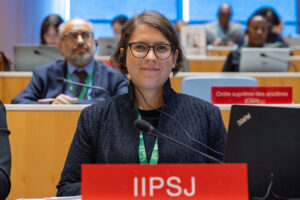
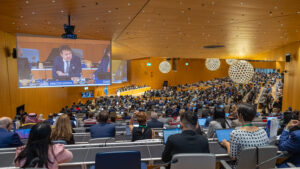
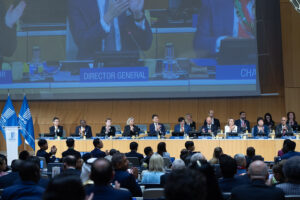
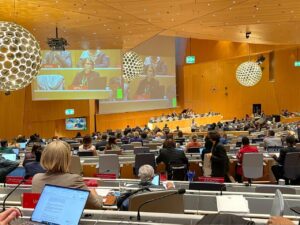
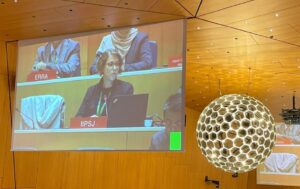
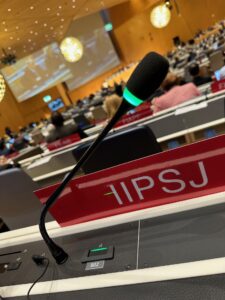
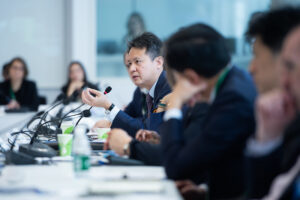
Blog Post: Call for Book Chapter Proposals
A New Book on IP and Social Justice:
Call for Chapter Proposals
Lateef Mtima, Kara Swanson, Trevor Reed, Eds.
Intellectual property legal theorists, pundits, and policy makers increasingly embrace the proposition that IP protection not only supports producer incentives and creative and innovative benefits typically within the commercial sphere. IP protection can also be construed and implemented to produce outcomes that promote social justice. In this vein, a collection of international IP scholars, policy makers, and practitioners collaborated in the recent publication of The Cambridge Handbook of Intellectual Property and Social Justice, which volume undertakes to articulate a discrete theory of IP Social Justice and to explore some of the social benefits that might be gained through its application to the IP ecosystem.
Whereas the Cambridge IP SJ Handbook demonstrates how a social justice approach to IP protection can expand the social capability of the IP legal regime, the anthology further engenders the consideration of a broader, sequential question: beyond supplementing traditional IP theories and rationales, to what extent might IP SJ supplant such prevailing perspectives, towards greater fulfillment of the social function of IP protection to promote human development and wellbeing? As a follow up to the IP SJ Handbook, a new volume will explore this and related questions.
Call for Book Chapter Proposals
Through this call for book chapter proposals, we invite submissions that
(A) consider, compare, contrast, and/or critique the tenets of IP SJ (i) in the context of traditional IP theoretical rationales, such as economic utility, natural rights, and human rights law; and/or (ii) in the context of non-traditional IP theoretical rationales, such as decolonial theory, feminist theory, queer theory, and critical legal/critical race theory.
(B) explore how IP SJ theory might be applied to address specific contemporary IP challenges, particularly those which the prevailing IP rationales have so far proven incapable of addressing, including problems such as addressing TKCE achievement, AI technologies, global warming issues, and other current IP-related concerns.
This call for chapter proposals is intentionally international in scope, both with respect to subject matter and contributors. Prospective contributors are encouraged to contemplate the global future of IP law and policy, whether from the perspective of reinforcement and reform or of revolution and deconstruction, although proposals that use a specific country or region to illuminate the topic would be welcomed. Proposal abstracts should be no more than 250 words in length and submitted by September 1, 2025; for accepted abstracts, the deadline for submitting preliminary chapter drafts of at least 3,000 words (but no more than 10,000 words including footnotes) is December 1, 2025, whereafter contributing authors will be invited to participate in an in-person/hybrid roundtable workshop to discuss drafts. The editors anticipate that final drafts will be limited to 5,000-8,000 words including footnotes and will be due no later than July 1, 2026. Publication of the volume is projected for Fall 2026.
Proposal abstracts or questions should be sent to Victoria Fisher at Victoria.Fisher@iipsj.org.
Blog Post: The White House Initiative to Promote Excellence and Innovation at Historically Black Colleges and Universities - Ensuring the Broadest Participation in the American IP and Innovation Ecosystem
The White House Initiative to Promote Excellence and Innovation at Historically Black Colleges and Universities: Ensuring the Broadest Participation in the American IP and Innovation Ecosystem
On April 23, 2025, President Trump issued an Executive Order entitled “The White House Initiative to Promote Excellence and Innovation at Historically Black Colleges and Universities.” The White House HBCU Initiative reflects the Administration’s acknowledgement of and support for the critical role that HBCU institutions continue to play in ensuring that all Americans enjoy the opportunity to excel through and contribute to the national advancement, including through participation in the American IP regime and Innovation Ecosystem.
The White House HBCU Initiative expressly recognizes that “Historically Black Colleges and Universities (HBCUs) remain integral to American students’ pursuit of prosperity and wellbeing, providing the pathway to a career and a better life.” Through the Initiative, the Trump Administration pledges to “continue the work begun during [the] first [Trump] Administration to elevate the value and impact of our Nation’s HBCUs as beacons of educational excellence and economic opportunity that serve as some of the best cultivators of tomorrow’s leaders in business, government, academia, and the military.”
Among The White House HBCU Initiative’s core goals include “providing professional development opportunities for HBCU students to help build America’s workforce in technology, healthcare, manufacturing, finance, and other high-growth industries…working to advance…key priorities related to promoting innovation and excellence throughout HBCUs in consultation with HBCU leaders, representatives, students, and alumni [and] collaborating with agencies to improve the competitiveness of HBCUs for other sources of Federal research and development funding”.
Just as IP achievement remains at the forefront of American advancement in science, and technology, and the arts, The White House HBCU Initiative is an important component of a comprehensive strategy for ensuring that all Americans enjoy meaningful opportunities through which to develop and exploit their innovative and artistic talents, through academic research and technology transfer, and other entrepreneurial commercialization of their resulting accomplishments.
Through The White House HBCU Initiative, the Trump Administration takes an important step towards ensuring that every American cohort, including rural communities, veterans, elder citizens, and those who have educated themselves in non-elite or non-traditional settings, such as trade schools, and community colleges, as well as in more traditional HBCU settings, are all able to enjoy the opportunity and the privilege to participate in and contribute to America’s innovation and artistic storehouse.
IIPSJ commends the Trump Administration for this effort to effectuate a balanced approach to promoting nationwide IP engagement fully consonant with the IIPSJ Mission. We hope you will review the full text of “The White House Initiative to Promote Excellence and Innovation at Historically Black Colleges and Universities.”
2025 IP & Social Justice CLE Recap
“IIPSJ’s annual conferences played an important role in developing a social justice perspective in intellectual property law and policy. The Institute’s mission is a vital one”- Honorable Raymond T. Chen
For the 22nd Annual IP and Social Justice CLE Program, co-hosted by law firm Finnegan, Henderson, Farabow, Garrett & Dunner LLP, key attendee sessions included: (a) our Annual IP Year in Review, (b) Social Justice Luncheon Plenary Sessions: IP Social Justice in Legal Practice: Preparing Practitioners for Contemporary Challenges, and (c) the Annual Donald R. Dunner Judicial Panel, which included insights and reflections from the Honorable Leonard P. Stark, Judge with the United States Court of Appeals for the Federal Circuit, the Honorable Kara F. Stoll, Judge with the United States Court of Appeals for the Federal Circuit, and the Honorable Susan G. Braden, Former Chief Judge (retired) of the United States Court of Federal Claims.
The IP and Social Justice CLE Conference benefits from participation from all demographics within the IP legal community: attorneys in private practice, in-house counsel corporate departments, government agencies, and public interest NGOs, as well as members of the judiciary and government officials. The CLE Program was co-chaired by Tashia Bunch, Esther H. Lim, and Idris N. McKelvey.
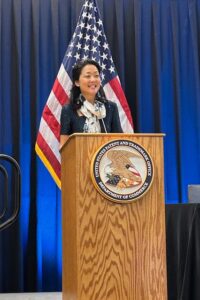
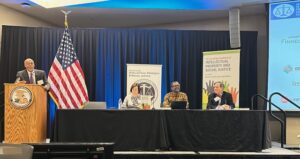
IP Social Justice Lifetime Achievement Award:
The Institute for Intellectual Property and Social Justice honored Patricia Carter Ives Sluby, L.H.D. with a IP Social Justice Lifetime Achievement Award. Dr. Sluby joined the US Patent and Trademark Office as a patent examiner in the early days of the Equal Employment Opportunity program and later achieved the primary status followed by a special programs Patent Cooperation Treaty examiner. Upon leaving the USPTO she became a registered patent agent.
Dr. Sluby began compiling information on African American inventors, including women inventors and published articles in patent office journals and many other national publications including the 1990 Bicentennial Celebration—United States Patent and Copyright Laws Proceedings, Events and Addresses. She self-published her first book in 1987, Creativity and Inventions: The Genius of Afro-Americans and Women in the United States and their Patents. and after retirement published books in 2004, The Inventive Spirit of African Americans, and 2011, The Entrepreneurial Spirit of African American Inventors. Pat herself holds 22 registered copyrights. She is co-curator of the exhibit, Patented Ingenuity: The Art of African American Inventors, at the Prince George’s African American Museum and Cultural Center.
Dr. Sluby is past president of the National Intellectual Property Law Association, educating the minority community in IP, placement of IP professionals, and legislation, and member of the board of directors of the Museum for Black Innovation and Entrepreneurship. She has appeared widely on radio, TV, and internet programs, once serving as the spokesperson for the USPTO on CNN. She has also served as a contributing editor of the journal of the National Society of Black Engineers.
Her distinguished service includes Department of Commerce Science and Technology Fellow, serving on the subcommittee on Domestic Monetary Policy for the U.S. House of Representatives Committee on Banking, Finance, and Urban Affairs where she drafted a bill to place the first woman bank president in the US on a coin and special director in the Office of Cultural Resources of the National Park Service.
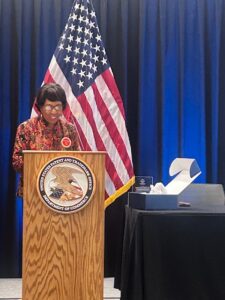
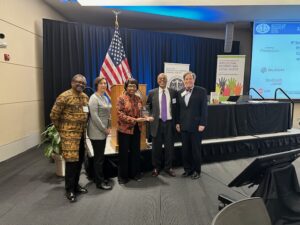
The 2025 CLE Sessions were:
• Key Highlights of 2024: Patent, Trademark, and Copyright
• Donald R. Dunner Judicial Panel
• IP Social Justice in Legal Practice: Preparing Practitioners for Contemporary Challenges
• Trademark, Entertainment, and NIL
• Perspectives on The Rise of Trade Secrets
• Al and Impacts on Patent System Inclusion
• Ethics
View the session video for IP Social Justice in Legal Practice: Preparing Practitioners for Contemporary Challenges here.
Thank you to our sponsors!

![]()
![]()
![]()
![]()



Blog Post: IIPSJ Co-Sponsors 2025 Race + IP Conference
IIPSJ Co-Sponsors 2025 Race + IP Conference

The Institute for Intellectual Property and Social Justice (IIPSJ) is excited to announce that it is a co-sponsor of the 2025 Race + IP Conference.
Race + IP is a conference dedicated to cultivating community and collaboration around the study of race, coloniality, and intellectual properties. The fifth anniversary conference, Race + IP ’25: Abolitionist Futures, scheduled for April 17-19, 2025 at the University of Pittsburgh, asks what it means to think about the transformative justice term “abolition” alongside “intellectual property,” or perhaps more aptly “knowledge governance.”
As a conference speaker, IIPSJ Founder and Director Lateef Mtima will support this important conversation, aspiring to encourage a shift in the socio-legal conceptualization of intellectual property as space to be policed and imagining how it can be reimagined through new frameworks that emphasize reparation without punishment.
Registration is free, and attendees can participate in person or virtually.
Learn more about the 2025 conference here.
Register for the conference here.
Blog Post: IIPSJ Program Assistant Victoria Fisher Recognized as 2024 Women in STEM Ambassador of the Year
IIPSJ Program Assistant Victoria Fisher Recognized as 2024 Women in STEM Ambassador of the Year
The Institute for Intellectual Property and Social Justice (IIPSJ) proudly introduces Victoria Fisher, our newest team member and a 2024 honoree of the Department of Commerce Women in STEM Ambassador Program. Recognized on November 1, Victoria was celebrated for her outstanding contributions to increasing diversity in STEM.
The Women in STEM Ambassador Program promotes representation in STEM fields by engaging students and professionals through mentorship and outreach. As an ambassador, Victoria led nearly 20 events, including judging biomedical engineering projects at the Regeneron International Science and Engineering Fair and mentoring students at the Youth Entrepreneur Institute in Washington, D.C.
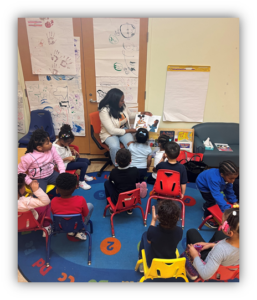
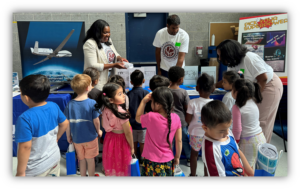
In her acceptance speech, Victoria reflected on her journey in STEM, recalling challenges such as the absence of women’s restrooms in her college’s engineering building—a reminder of the field’s historical gender disparities. She emphasized the importance of representation, stating, “Each moment we spend inspiring young minds, breaking down barriers, and challenging stereotypes is a step toward a future where every girl believes she belongs in STEM.”
As a Primary Patent Examiner at the USPTO and IIPSJ’s Program Assistant and Administrator, Victoria continues her mission to expand access to STEM and intellectual property education. We are honored to have her on our team and look forward to her continued impact.
Blog Post: 2024 End of Year Recap
2024 End of Year Recap
As we close another successful year, we want to highlight some of the impact of your contributions for 2024:
The Nexus of Social Justice and Intellectual Property
- Our monthly newsletters (https://iipsj.org/latest-news/) provided readers with timely and relevant recent developments in intellectual property law that have particular impacts on diverse communities and the concept of social justice.
- Working with our various academic partners, IIPSJ organized the 10th annual IP MOSAIC Conference (https://iipsj.org/programs/ip-mosaic/). The theme was Looking Forward, Looking Back: IP Social Justice & Promoting Human Ingenuity.
Diversifying the Legal Field and the Intellectual Property Bar
- For twenty-one years, the IIPSJ IP and Social Justice CLE program (https://iipsj.org/2024-ip-social-justice-cle-recap/) has provided a venue through which to showcase minority and women IP attorneys. The 21st Annual IP & Social Justice CLE program (https://www.youtube.com/playlist?list=PLpjeDSnL4i4lEMJf0N-48iqiZYF-CBvSb) explored the latest developments in IP law, including the relevant social justice impacts, strategies, and opportunities for enhancing the social efficacy of the IP legal regime.
- Working with our various academic partners and event sponsors, IIPSJ organized the 6th Annual HBCU IP & Tech Law Summit (https://iipsj.org/programs/hbcu-ip-tech-law-summit/), where the audience was treated to leading technology lawyers discussing Artificial Intelligence, Data Security and Privacy, Blockchain and more.
- In September, IIPSJ participated in the 2nd Innovator Diversity Pilots Conference (https://law.emory.edu/impact/conferences/innovator-diversity-pilots-conference.html), where the USPTO, the National Council on Patent Practicum (NCPP), Adapt.Legal and a host of sponsors came together to discuss projects and effective practices to increase participation in innovation. IIPSJ was a Silver Sponsor of this year’s conference, and IIPSJ Founder and Director Lateef Mtima moderated the Law Firm Diversity Initiatives panel, which discussed innovative law firm initiatives to facilitate the entry of diverse candidates into IP-related fields.
- With the goal of highlighting minority IP attorneys to serve as role models to encourage the pursuit of careers in IP practice, IIPSJ continued our Attorneys of Color in IP interview series (https://iipsj.org/blog-post-ip-attorney-interviews/), which featured an interview with patent litigation attorney Esther Lim.
- IIPSJ launched the HBCU IP and Tech Law Summit Intellectual Property (IP) Internship Grant Program, which was sponsored by INTA Foundation. Under this grant program, we sought to enable students enrolled in a participating HBCU law school to work as unpaid interns for public interest organizations in connection with trademark, copyright, and other IP matters. This grant program supported students who would not be able to participate in an unpaid internship without receiving additional monetary support.
Advocacy for Participation in the Intellectual Property System
- The Cambridge Handbook of Intellectual Property and Social Justice was published, which was co-edited by IIPSJ Director Lateef Mtima and Assoc. Director Steven Jamar.
- In July, IIPSJ Associate Director for International Programs, Dr. Metka Potočnik, attended the 65th World Intellectual Property Organization (WIPO) General Assemblies (GA) (https://iipsj.org/iipsj-attendance-at-the-65th-world-intellectual-property-organization-general-assemblies/) at the WIPO Headquarters in Geneva and represented IIPSJ as a WIPO Accredited Observer. Dr. Potočnik delivered an oral statement (https://iipsj.org/blog-post-iipsj-oral-statement-to-wipo/) and attended the length of the proceedings in person.
Community Outreach that Empowers Creators of Color to Share, Protect, and Monetize Their Work
- IIPSJ continued our Intellectual Property for the People Series (https://iipsj.org/programs/ip-for-the-people-open-academy/) to help creators, inventors, and entrepreneurs from communities of color understand and explore the rights and resources available to them. This year’s series included the following free, one-hour webinars: Practical Guidance on Protecting your Patent and Trademark, How to go from Inventor to Entrepreneur, IP for Entrepreneurs, and Innovation and IP. Replays of all sessions are available on our YouTube page (https://www.youtube.com/playlist?list=PLpjeDSnL4i4mPRA4CX44FjLcSUv1CyMug). The series will continue to run in 2025, with necessary topics such as avoiding pitfalls in the trademark application process and fashion law.
- In conjunction with the Howard University School of Law and Wikimedia, IIPSJ continued the Wikimedia Race and Knowledge Equity (WRKE) Fellowship (https://iipsj.org/wikimedia-race-and-knowledge-equity-fellowship/) and hosted six Wikimedia Race and Knowledge Equity (WRKE) Fellows (https://iipsj.org/2023-2024-wrke-fellows/).
2024 IP & Social Justice CLE Recap
“IIPSJ’s annual conferences played an important role in developing a social justice perspective in intellectual property law and policy. The Institute’s mission is a vital one”- Honorable Raymond T. Chen
For the 21st Annual IP and Social Justice CLE Program, key attendee sessions included our Annual IP Year in Review, Social Justice Luncheon Plenary Sessions: Increasing Diversity in Innovation and HUSL-ing In-house at JPMC, as well as the Annual Donald R. Dunner Judicial Panel, which included insights and reflections from the Honorable Leonard P. Stark, Judge with the United States Court of Appeals for the Federal Circuit, the Honorable Patricia Tolliver Giles, Judge with the United States District Court for the Eastern District of Virginia, the Honorable Scott R. Boalick, Chief Administrative Patent Judge with the Patent Trial and Appeal Board in the U.S. Patent and Trademark Office, and the Honorable Susan G. Braden, Former Chief Judge (ret.) with the United States Court of Federal Claims.
The IP and Social Justice CLE Conference benefits from participation from all demographics within the IP legal community: attorneys in private practice, in-house counsel corporate departments, government agencies, and public interest NGOs, as well as members of the judiciary and government officials.
The IP and Social Justice CLE Program was co-hosted by law firm Finnegan, Henderson, Farabow, Garrett & Dunner LLP, with Finnegan Partner & Chief Diversity and Inclusion Officer Esther H. Lim being presented with the IP Social Justice Lifetime Achievement Award.
The 2024 CLE sessions were:
- Key Highlights of 2023: Patent, Trademark, and Copyright
- Donald R. Dunner Judicial Panel
- Increasing Diversity in Innovation
- HUSL-ing In-house at JPMC
- Inclusive Innovation and Cutting-Edge IP Strategies
- How to Help the Trial Court Judge Understand Patent Law
- Embracing the Future of AI, Cybersecurity, and Privacy
- Updates on College Athletes’ NIL & Celebrities’ Right of Publicity
- Ethics
View the IP and Social Justice CLE session videos here.
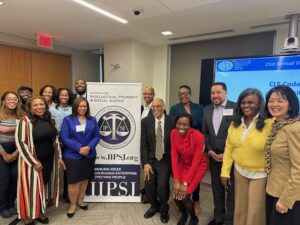
Thank you to our sponsors!
![]()


![]()
Blog Post: WRKE Fellow Project Update
Wikimedia Race and Knowledge Equity (WRKE) Fellow Project Update
Kainen Bell, PhD Candidate at the University of Illinois – Urbana Champaign, and 2023/2024 WRKE Wikimedia Foundation Fellow, recently completed the 2024 Summer Global Policy Fellowship at the Institute for Technology and Society (ITS) in Rio De Janeiro, Brazil. He was one of ten researchers selected worldwide who share common interests in technology and its interfaces with law, and who want to expand their knowledge about the Brazilian technological context.
The intensive four-week program took place in July, and included a series of meetings with ITS partners in Rio de Janeiro, Brasília, and São Paulo including the Ministry of Science, Technology, and Innovation, Brazil’s National Data Protection Agency, NuBank, The Center for Security and Citizenship Studies (CESeC), and others concerned with AI Development and Regulation in Brazil. Bell also presented a lecture titled, “AI Ethics: Regulating Facial Recognition in Brazil” at the International School of Law and Technology offered by ITS in partnership with the University of Montréal.
Bell will remain in Brazil conducting his dissertation research which uncovers algorithmic biases and follows the work of digital rights activists and organizers of anti-surveillance campaigns in Brazil who protest facial recognition camera initiatives. His goal is to learn how Afro-Brazilian communities collaborate to resist and prevent the abuse of surveillance technologies in their neighborhoods.
The findings from his dissertation fieldwork and ITS Global Policy Fellowship contribute towards his WRKE fellowship project, which is to dedicate time into creating resources, documents, and publications to support the efforts of the national anti-surveillance campaign in Brazil.
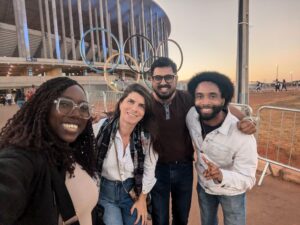
(Kainen Bell on the far right with other ITS Global Policy Fellows outside of the National Soccer Stadium in Brasília, Brazil)


